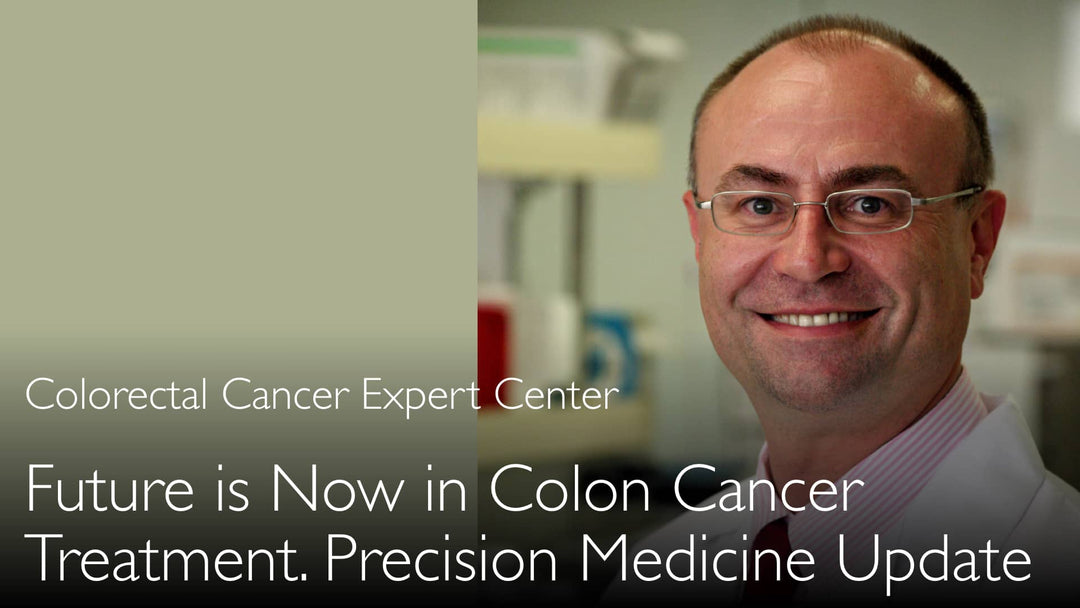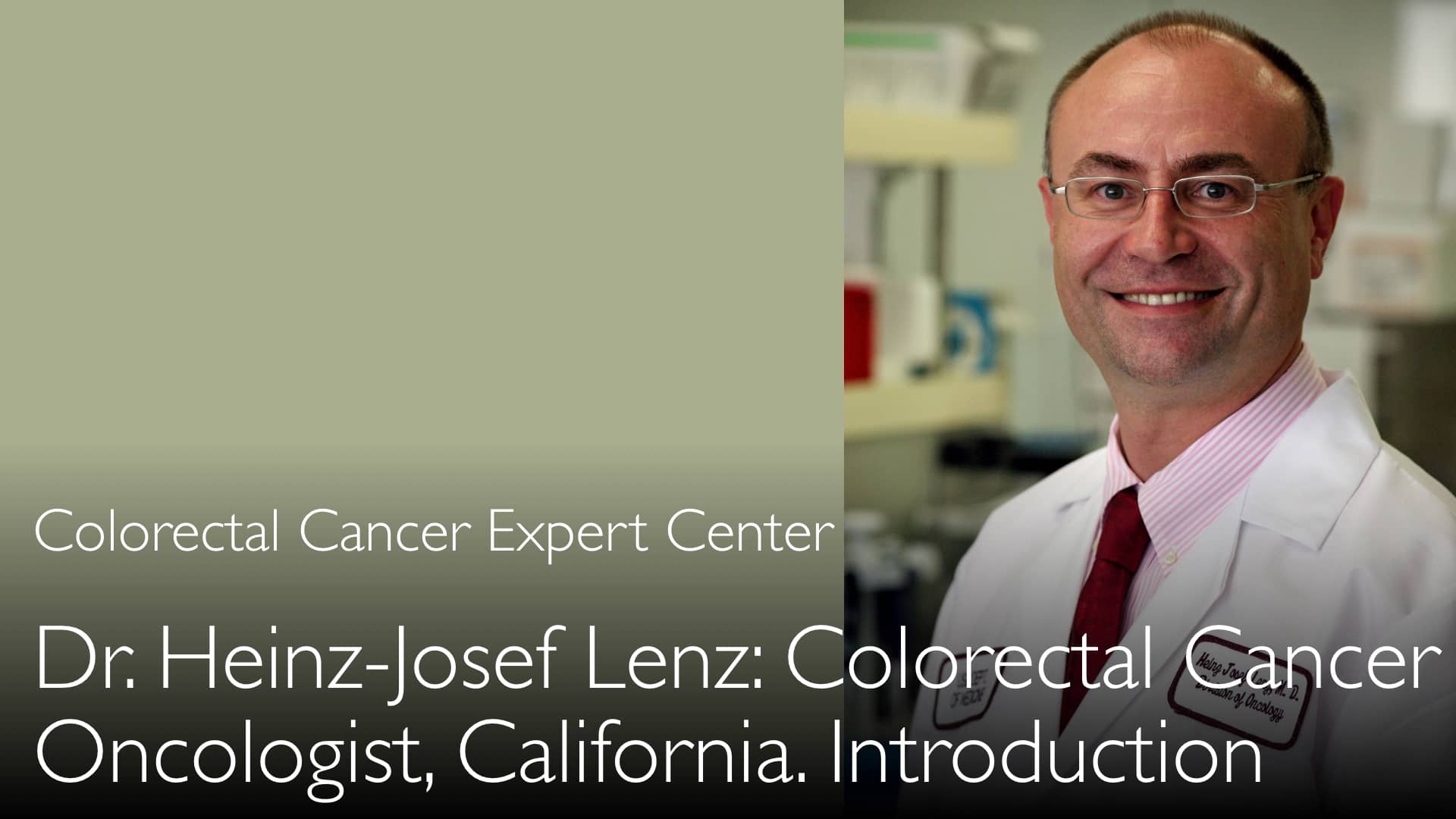מומחה מוביל בסרטן המעי הגס, ד"ר היינץ-יוזף לנץ, MD, מסביר כיצד רפואה מותאמת אישית תשנה את הטיפול בסרטן המעי הגס ותוביל לריפוי. הוא מפרט את עתיד המיפוי המולקולרי המלא לכל מטופל, ניטור בזמן אמת של הגנטיקה הגידולית לחיזוי ומניעת עמידות, וסיווג מחדש של סרטן מעי גס גרורתי לעשרות מחלות מולקולריות נפרדות. ד"ר לנץ צופה כיוונון לתאי גזע סרטניים ופיתוח אסטרטגיות מניעה ספציפיות, במטרה לרפא את כל החולים בתוך עשור.
התקדמות ברפואה מותאמת אישית בטיפול בסרטן המעי הגס וריפוי עתידי
קפיצה לפרק
- עתיד המיפוי המולקולרי
- ניטור בזמן אמת ועמידות
- הגדרה מחדש של מחלה גרורתית
- טיפול בתאי גזע סרטניים
- אסטרטגיות מניעה מותאמות אישית
- תמליל מלא
עתיד המיפוי המולקולרי
ד"ר היינץ-יוזף לנץ, MD, צופה שמיפוי מולקולרי מקיף יהפוך בקרוב לסטנדרט עבור כל חולי סרטן המעי הגס. ניתוח גנטי מלא זה של הגידול חורג מהבדיקות המוגבלות הנוכחיות לסמנים כמו KRAS, NRAS, BRAF, ו-MSI (מצב חוסר יציבות מיקרוסטליט). ד"ר היינץ-יוזף לנץ, MD, מסביר שמיפוי מולקולרי נרחב זה הוא אבן היסוד של הרפואה המותאמת אישית, המאפשר לאונקולוגים לבחור את תוכנית הטיפול היעילה והמותאמת אישית ביותר עבור כל פרט.
ניטור בזמן אמת ועמידות
התקדמות עתידית קריטית בטיפול בסרטן המעי הגס כוללת ניטור בזמן אמת של הפרופיל המולקולרי של הגידול במהלך הטיפול. ד"ר היינץ-יוזף לנץ, MD, מציין שגישה זו מאפשרת לרופאים לזהות את המנגנונים הספציפיים של עמידות לכימותרפיה ככל שהם מתפתחים. יכולת זו משמעה שרופאים יכולים לחזות התקדמות סרטן ולשנות טיפול עוד לפני שגידול נראה על סריקת CT, ובכך לשנות באופן יסודי את הטיפול במחלה מתגובתי לפרואקטיבי.
הגדרה מחדש של מחלה גרורתית
רפואה מותאמת אישית תגדיר מחדש סרטן מעי גס גרורתי לא כמחלה אחת, אלא כ-40 עד 100 מחלות שונות המוגדרות מולקולרית. ד"ר היינץ-יוזף לנץ, MD, מדגיש שכל פרופיל גנטי ייחודי ינחה אסטרטגיית טיפול ספציפית ויעילה ביותר. סיווג מולקולרי מפורט זה מבטיח טיפולים עם יעילות גבוהה יותר ורעילות נמוכה יותר, ומתרחק מגישת "מידה אחת מתאימה לכולם" בטיפול בסרטן המעי הגס מתקדם.
טיפול בתאי גזע סרטניים
מטרה עתידית מרכזית היא פיתוח תרופות שמכוונות ספציפית לתאי גזע סרטניים של סרטן המעי הגס. ד"ר היינץ-יוזף לנץ, MD, מזהה תאים אלה כסיבה העיקרית לכישלון טיפול במחלה גרורתית, שכן הם עמידים הן לכימותרפיה קלאסית והן לטיפולים ממוקדים נוכחיים. הבחנה מוצלחת וחיסול של תאי גזע עמידים אלה נחשבים חיוניים להשגת ריפוי מתמשך עבור חולי סרטן המעי הגס.
אסטרטגיות מניעה מותאמות אישית
עתיד הטיפול בסרטן המעי הגס extends beyond treatment to include molecularly-guided prevention. ד"ר לנץ envisions strategies based on a deep understanding of tumor biology, which could include specific dietary recommendations or preventive medications for high-risk individuals. This shift towards personalized prevention, informed by family history and genetic risk, aims to stop cancer before it even develops.
תמליל מלא
ד"ר היינץ-יוזף לנץ, MD: בשנים הקרובות, נבצע מיפוי מולקולרי מלא של כל חולי סרטן המעי הגס. ננטר שינויים בפרופיל המולקולרי של סרטן המעי הגס בזמן אמת. נוכל לזהות את מנגנון העמידות לכימותרפיה. נוכל לחזות התקדמות של סרטן המעי הגס.
סרטן מעי גס גרורתי לא יהיה עוד מחלה אחת. זה עשוי להיות 50 מחלות, 40 מחלות, או 100 מחלות. סרטן מוגדר על ידי המיפוי המולקולרי של גידול סרטן המעי הגס. בעוד 10 שנים, אני מקווה שנרפא את כל חולי סרטן המעי הגס.
ד"ר אנטון טיטוב, MD: זו הייתה שיחה מאוד מעניינת. חשוב לדבר על מה שהעתיד יביא בטיפול בסרטן המעי הגס וסרטן החלחולת. אתה מאוד אופטימי regarding treatments מאוד מרגשים של סרטן המעי הגס. הצלחה מושגת באמצעות רפואה מותאמת אישית ורפואה מדויקת.
There is specific molecular testing and diagnosis of patients with colon cancer. You are a leader in colorectal cancer research and treatment. What do you see as the most important new diagnostic and treatment options in the next 10 years for patients with colorectal cancer?
Maybe you could give some specific examples of colon cancer treatment advances. Please add to what you've already talked about.
ד"ר היינץ-יוזף לנץ, MD: I don't know what will happen in 10 years, but I will tell you what will happen in the next couple of years. I think it happens already in very select clinics. We will do full molecular profiling of colon cancer patients. Extensive molecular profiles of colon cancer tumors will be done.
But they will sometimes make it very difficult for us to understand what all the genetic profiling results really mean. Molecular tumor profiling allows us now to select the best treatment options for colorectal cancer patients.
We will monitor colon cancer molecular profile changes in real time. We can identify the mechanism of resistance to chemotherapy. We can predict risks of progression of colon cancer. We will know before the colon cancer tumor starts growing again.
We will see into the future what will happen with the tumor. This will allow us to interfere with the treatment before colon cancer progression is visible on a CT scan. That's the first future advance in colon cancer treatment.
The second advance in colon cancer treatment is this: with the molecular classification of colon cancer, we will develop treatment options for more patients. Precision medicine treatment is defined by the unique patient and tumor profile.
Today, we have only the KRAS molecular tumor marker. Tomorrow, we will have many molecular tumor profile factors. They will point very clearly to specific treatments with high efficacy and low toxicity.
Colon cancer and metastatic colon cancer will not be one disease anymore. It may be 50 diseases, 40 diseases, or 100 diseases. Each variant of cancer will be defined by the molecular profiling of the colon cancer tumor.
With this approach, the goal has to be to cure more and more patients. I think in the future we will have very specific new medications that target colon cancer stem cells. Cancer stem cells are the ultimate reason for the failure of all our treatments of metastatic colon cancer.
Colon cancer stem cells cannot be treated or killed by classical chemotherapy treatments. Cancer stem cells cannot be eliminated even by the new targeted medications that we have now.
We really need to differentiate colon cancer stem cells from simple tumor cells. Then we can kill differentiated cancer stem cells with chemotherapy. In 10 years, I hope we will have cured all colon cancer patients.
We will develop very molecular-specific prevention strategies for colorectal cancer. That will prevent colon cancer in the future. Colon cancer prevention strategies should be based on our understanding of the molecular biology of colon cancer tumor cells.
Colon cancer prevention methods will include eating broccoli and consuming more fiber. It will be very specific family intervention in very specific high-risk patients for colon cancer development.
To prevent colon cancer effectively, we will know that certain high-risk people will need to use this medication or that medication in the future.
ד"ר אנטון טיטוב, MD: This is a very exciting conversation. Professor Lenz, thank you very much for sharing your enthusiasm for your research achievements. Thank you for sharing insights from your clinical work in colorectal cancer. Thank you very much for this conversation!
We are looking forward to returning to the conversation in the future.
ד"ר היינץ-יוזף לנץ, MD: Absolutely. Thank you so much! The future of precision medicine in colorectal cancer is now. Metastatic stage 4 colon cancer patients will be cured with molecular medicine advances.





